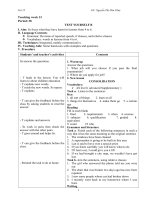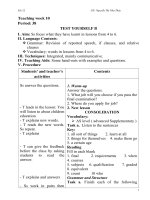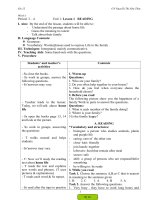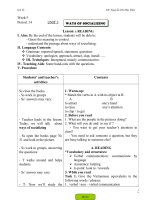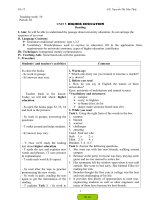unit 2 GIÁO ÁN MÔN TIẾNG ANH LỚP 12
Bạn đang xem bản rút gọn của tài liệu. Xem và tải ngay bản đầy đủ của tài liệu tại đây (224.8 KB, 15 trang )
GA 12
Week:3
Period: 9
GV: Nguyễn Thị Như Thủy
UNIT 2:
CULTURAL DIVERSITY
Lesson 1: READING
I. Aim: By the end of the lesson, students will be able to:
- Understand the passage about cultural diversity
- Guess the meaning in context
II. Language Contents:
Grammar: present perfect progressive, past perfect.
Vocabulary:attitudes toward love and marriage, wedding ceremony.
III. Techniques: Intergrated, mainly communicative.
IV. Teaching Aids: Some hand-outs with the questions.
V. Procedure
Students’ and teacher’s
activities
Contents
1. Warm-up
Ss close the books.
- Ss work in groups, answer the Questions:
1. Who are your family?
following questions.
2. Do you often help together in your house?
- Ss’answers may vary.
2. Before you read
Discuss the question: Which of the following factors
in the most important for a happy life? why?
* love, a nice house/ flat, money, a good job,
- Teacher leads in the lesson: parents’ approval, good health
Today, we will talk
about
A. READING
cultural diversity
*Vocabulary and structures:
- Ss open the books page 20, 21 - Tradition: custom – traditional – traditionally
and look at the picture.
- To mary – get married – marriage
- contractual marriage
- Ss work in groups, answering
- To determine – determination : to find out
the questions:
- wise (adj ) intelligent, smart
- T walks around and helps - To reject: knock out
- To confide: giao pho, chia se to trust
students.
- partnership: contribution
- Ss’answer may vary.
- sacrifice: su cung than, su hy sinh to willingly
stop having something you want
- significant: important
- T: Now we’ll study the reading
- To oblige: put in force, having a duty to do
text about cultural diversity
something
- T reads the text and explains
new words and phrases. (T uses - counterpart: ben tuong ung, doi tac
3. While you read
pictures & explanations)
- T reads each word & Ss repeat. Task 1. Explain the meaning of the italicized words /
phrases in the following sentences
1
Me too.
GA 12
GV: Nguyễn Thị Như Thủy
1. precede: to happen or exist before
2. determine: to find out
- Ss read after the tape to practise 3. confide: to trust
pronouncing the new words.
4. to sacrifice: to willingly stop having something
- Ss work in pairs, reading the
you want
text again to get the information 5. obliged: having a duty to do something
of the reading.
Task 2. Answer the following questions.
1. Americans believed in “ romantic marriage “- a
boy and girlwere attracted to each other, fell in
- T explains Task 1. - Ss work in
love, and decided to marry each other. Asians
groups.
believed in “ contractual “ marriage – the parents
- T walks around & helps Ss.
usually decided on the marriage; and love was
- T can give the feedback before
supposed to follow marriage, not precede it
the class by asking Ss to answer
They are trust on building love ; physical
A,Bor C
attractiveness;
confiding partnership of
equals
2. The Americans were much more concerned than
- T explains Task 2: Now you
the
Indians
and
Chinesewith
physical
answer the questions in Task 2
attractiveness when choosing a wife or husband
- Ss work in pairs, asking and 3. The Indian students agreed that “ a woman has to
answering the questions.
sacrifice more in marriage than a man “
- Ss check the answers together.
4. The American wife, for example, trust her
- T goes around & helps Ss.
husband to “ do the right thing” because “ he
loves her” not because “he has to”
- T can give the feedback before 5. The Asian young people are far from being as
the class by asking Ss to ask and
romantic as their American counterpart
answer the questions.
4. After you read
Discuss the question: What are the differences
between a traditional Vietnamese family and a
- T suggests Ss’ homework.
modern Vietnamese family
Suggested questions:
5. Homework:
- Laern by heart new words
- Prepare speaking
* COMMENTS:
---------------------------------------------------------------------------------------------------------------------------------------------------------------------------------------------------------------------------------------------
2
GA 12
GV: Nguyễn Thị Như Thủy
Week:3
Period: 10
UNIT 2:
CULTURAL DIVERSITY
Lesson 2: SPEAKING
I. Aim: By the end of the lesson, students will be able to:
- Know about some typical feartures of different cultures
- talk about the differences and similarities between Vietnamese and American
cultures
II. Language Contents:
Grammar: present perfect progressive, past perfect.
Vocabulary: confide ,determine,maintain,oblige,precede,reject ,sacrifice
III. Techniques: Intergrated, mainly communicative.
IV. Teaching Aids: Some hand-outs with the questions.
V. Procedure
Students’ and teacher’s
activities
Contents
1. Warm-up
Ss close the books.
- Ss work in groups, talking Tell class about the traditional Vietnamese family
about what they’ve learnt
- T calls some representatives to
Unit 2: SPEAKING
tell about some traditions
Talking about your point of view
- T leads in the lesson: Today 2. Before you speak
we’ll practise talking about Task 1 Express your point of view on the following
ideas, using the words or expression in the box.
some traditions
@ In Vietnam, three or even four generations may
live in a home.
- Ss open the books.
- T explains Task1: Discuss in @ A happy marriage should be based on love.
@ In some Asian countries, love is supposed to
groups about:
follow marriage not precede it
* What an ideal your family
* Giving two qualities each @ In some countries, a man and a woman may hold
should have and two qualities hands and kiss each other in public
Ex: I think it is a good idea to have three or four
each should not have.
- Ss work in groups then generations living under one roof. They can help
each other a lot
exchange together.
- That’s not true. In some countries many old aged
- T goes around & helps Ss.
parents like to live in a nursing home. They want to
lead independent lives
- Ss’answers may vary.
- T can give the feedback before 3. While you pseak
the class by asking Ss to answer Task 2. Below are some typical features of American
culture. Work in pair, discuss and find out the
the questions.
corresponding features of Vietnamese culture.
- T asks Ss to practise the
In America
In Vietnam
3
Me too.
GA 12
exchanges in task b fluently.
GV: Nguyễn Thị Như Thủy
-
- T explains Task 2,3 : In pairs,
you
practise
asking
and
answering about the family life
- T can give suggested models:
- Ss work in pairs, asking and
answering.
- T goes around & helps Ss.
- T calls one or two pairs of Ss to
practise the conversation before
the class .
-
Two generations live
in a home
Old aged parents
live
in
nursing
homes
It is not polite to ask
questions about age,
marriage and income
Americans can greet
anyone in the family
first
Groceries are bought
once a week
Christmas and New
Year holidays are
the most important
Children sleep in
their own bedrooms
- - Ss work in pairs.
- T goes around & helps Ss.
- T calls some students to tell
their likes (T can give marks)
-
-
-
- T suggests Ss’homework.
-
Three or even four
generations
live
under one roof
Elders live with
children and are
taken care by their
own son
Asking about age,
marriage and salary
is acceptable
A Vietnamese greets
the head of the
family or an older
person first then the
younger ones
Groceries are bought
everyday
Tet (Lunar New
Year) is the most
important
Vietnamese
celebrate death days.
They prepare meal
and invite their
relatives
to
get
together and talk
about good respect
of the dead person
Children often sleep
with their parents
Task 3. Talk about the similarities and differences
between Vietnamese and American cultures. Using
the features discussed in task 2
* Using the words such as “ but, yet, on the other
hand, however, on the contrary etc “
Ex:
4. After you speak
- Talk about your birthday party
5. homework:
- Prepare listening
* COMMENTS:
-----------------------------------------------------------------------------------------------------------------------------------------------------------------------------------------------------------------------------------------------------------------------------------------------------------------------------------------------------------------------------------------------------4
GA 12
Week:4
Period: 11
GV: Nguyễn Thị Như Thủy
UNIT 2
CULTURAL DIVERSITY
Lesson 3:
LISTENING
I. Aim: By the end of the lesson, students will be able to:
- listen for the understanding of the passage about a wedding in Vietnam
- listen for specific details
II. Language Contents:
Grammar: present perfect progressive, past perfect.
Vocabulary:altar,banquet,groom,tray,schedule, blessing
III. Techniques: Intergrated, mainly communicative.
IV. Teaching Aids: Cassette, tape and some hand-outs with the questions.
V. Procedure
Students’ and teacher’s activities
Ss work in groups,
- T can give the feedback before
the class by asking a student to
read the answers.
- T: Today, we’ll listen to a
wedding
- Ss open the books.
- T explains task1. Now you
complete the sentences with the
words and phrases in the box.
You try to guess the new words.
- Ss work in pairs.
- T goes around & helps Ss.
- T gives the feedback by asking
Ss to read the sentences aloud
before class.
- T explains new words.
Contents
1. Warm-up
Listen to a song “ A marriage in my country “ –
2. Before you listen.
Look at the picture in text book and discuss the
following questions:
1. Have you ever attended a wedding ceremony?
2. What do the bride and the groom usually do at the
wedding ceremony?
New words:
- Bride: co dau # groom
- Master of ceremony: a leader for the wedding
- banquet: party
- blessing: good luck
- ancestor; forefather
- schedule: arrange
3. While you listen
Task 1: Listen to the passage and fill in the missing
information
1. The wedding day is carefully chosen by the
……………
2. The gifts are wrapped in …………
3. The wedding ceremony starts in front of the
……….
4. Foods and drinks are served ………
5. The guests give the newly wedded couples
envelopes containing ……… and ……….
* Keys: 1. groom’s parents
2. red paper
3.
altar
4. at the wedding banquet
5. wedding cards /
money gifts
Task 2 Listen again and answer the quetions
5
GA 12
- T explains Task 2. You will
liten to then fill in the blanks
- Ss read the sentences in Task 1
carefully.
- Ss listen to the tape twice or
three times and fill in.
- Ss check their answer
sentences.(T can give marks)
.
- T replays the tape twice.
- Ss work individually, answering
the questions then check the
answers together.
- T gives the feedback by asking
Ss to ask and answer the
questions before class.
- Ss work in pairs, talking about a
Vietnamese wedding
- T goes around and helps Ss.
- T calls one or two student to
repeat each question and the
answer. (T can give marks)
GV: Nguyễn Thị Như Thủy
1. The most important thing the groom’s family has
to do on the day is to go to the bride’s house
bringing a lot of gifts wrapped in red papers
2. They would pray, asking their ancestors’
permissionto be married
3. After they pray, asking their ancestors’
permissionto be married
4. The wedding banquet is often scheduled at the
groomand bride’s home or at a hotel or a
restaurant
5. They stop by each table to say thank to their
guests
* Tapescript
Wedding in Vietnam
Tourist:
Can you tell me something about the
wedding ceremony in Vietnam?
Tourist guide: Well, wedding is very important to the
Vietnamese not only to the couple involved, but also
for both families. The wedding day is usually chosen
carefully by the groom’s parents
Tourist: What does the groom family usually do on
the wedding day?
Tourist guide: On the wedding day, the groom’s
family and relatives go to the bride’s house bringing
a lot of gifts wrapped in red papers. Those who hold
the traysof gifts are also chosen, they are usually
happy married couples.
Tourist: Do you have the Master of the ceremony?
And what does he do during the wedding ceremony?
Tourist guide: The Master of the ceremony
introduces the groom, the bride, the parents, the
relatives and guests of the two families. The wedding
ceremony starts in front of the altar. The bride and
the groomwould pray, asking their ancestors’
permission to be married. The Master of the
ceremony would give the wedding couple advice on
starting a new family. The groom and the bride then
exchange their wedding rings.
Tourist: Where is the wedding banquet held?
Tourist guide: Well, it depends. Often the wedding
banquet is scheduled at the groom and bride’s house
or at a hotelor a restaurant and all close relatives,
friends, and neighbours are invited
Tourist: What kind of food and drinks are served?
Tourist guide: Traditional, food and beer or wineare
served. During the reception, the groom and bride,
and their parents will stop by each table to say thank
to their guests. The guests in turn will give envelopes
containing wedding cards and money gifts to the
6
GA 12
GV: Nguyễn Thị Như Thủy
newly wedded couples along with their blessing.
Tuorist: Oh! That’s very interesting. Thank you.
Tourist guide: You are welcome!
4. After you listen
Discuss the question: What do families often do to
prepare for a wedding ceremony
5. Homework
- Write what you remember about a wedding (about
50 words).
* COMMENTS:
---------------------------------------------------------------------------------------------------------------------------------------------------------------------------------------------------------------------------------------------------------------------------------------------------------------------------------------------------------------------------------------------------------------------------------
7
GA 12
Week:3
GV: Nguyễn Thị Như Thủy
Period :12
Lesson 4: GRAMMAR:
SIMPLE PRESENT TENSE, PRESENT CONTINUOUS TENSE,
PRESENT PERFECT TENSE.
I. Aims: Sts can use correctly these tenses in each sentence.
II. Language content:
1. Grammar: present, present continuous, present perfect tenses.
2. Vocalbulary: all new words.
III.Techniques: Inductive method.
IV. Teaching aid: Model.
V. Proceduce:
Teacher’ and sts’ activities
Content
I. Greeting.
II. Revision.
Ask sts to write some forms of three tenses.
Ask sts questions – Then answer.
- What do you often do in the
morning? – I do my ex.
- When he comes what are you doing?
– I’m learning.
- How long have you learned English?
Check and correct.
III.Today’s lesson.
Grammar:
1.Simple present tense.
-S V inf
s/es (ch, sh,ss,x,z,o )
-S don’t /doesn’t Vinf
-Do/Does S Vinf ?
Adverbs are always used: always, usually,
rarely,….
Usage: with reqular actions happen day by
day.
2.Present continous tense.
is
is
S am Ving ;
S am not Ving
are
are
Is
Am S Ving ?
Are
Usage:
Use the continous for something that
happening at or around the time of
speaking. The action isn’t finished.
Adverbs are used in the tense: now, right
Sts write down the grammar.
Sts to give some examples If they can.
Eg 1: The girl (always/ get) to school by
bus. – gets.
2. He (never/ leave) his house late. –
leaves.
3. They (play) football very well? – Do –
play.
Write down.
- Explaining the form.
- Listen and write down what the
teacher explains for the lesson.
-
Give examples that helps sts
understand the lesson.
Eg: Can you hear those people? What they
(talk) about?
are – talking.
Hoa (stay) in bed now.
8
GA 12
GV: Nguyễn Thị Như Thủy
is staying.
now,at the moment …
Follow the imperative mood : look!, listen!,
Don’t …. , Please, ….
An action’ll happen in the future.
Give some examples.
1. You (ever/ ride) a horse?
Have – ridden.
2. She (live) there since she (move) ti
London.
has lived – moved.
3. Since he (come), he (not/ talk) to
anyone.
came, hasn’t talked.
1. Present perfect tense.
S have / has PP
; S have/has not PP
Have/ Has S PP ?
Usage:
- When we talk about period of time
that continous from the past until
now, we use the tense with today,
this morning when these periods are
not finished at the time of speaking.
- Adverbs: just, already, not…yet,
never,…
IV.Consolidation.
1.
Use correct tense of verbs in
parentheses.
1. While she (cook) in the kitchen, she
(hear) a knock at the door now.
2. They (sit) in the park now.
3. Mary (finish) her work yet?
4. They (write) the lesson for 2 hours.
2. Choose the best answer.
1. I (did/ had done/ have done) ex since
I (came/ come/ have come) here.
2. He (listen/ is listening/ has listened)
to music at this time.
3. He can (sing/ is singing/ has sung)
English songs well.
V. Homework:
- Do ex again.
Learn by heart the form of tenses.
Write down and do ex
Teacher corrects the ex.
1. is cooking - hears.
2. are sitting.
3. has – finished.
4. have written.
Work in pairs and finish the ex given
1. have done – came.
2. is listening.
3. sing.
Comment:
-----------------------------------------------------------------------------------------------------------------------------------------------------------------------------------------------------------------------------------------------------------------------------------------------------------------------------------------------------------------------------------------------------------------------------------------------------
9
GA 12
GV: Nguyễn Thị Như Thủy
Week:3
Period: 12
UNIT 2
CULTURAL DIVERSITY
Lesson 5: WRITING
I. Aim: By the end of the lesson, students will be able to:
- describe the typical feartures of a Vietnamese conical leaf hat.
- write the description of a conical leaf hat
II. Language Contents:
Grammar: present perfect progressive, past perfect.
Vocabulary: conical leaf hat.
III. Techniques: Intergrated, mainly communicastive
IV. Teaching Aids: pictures, handouts, realia.
V. Procedure
Students’ and teacher’s activities
Ss close the books.
- Ss work in groups, answering
the questions.
- T calls one or two Ss to answer
the questions.
- T leads in the lesson: Today we
are going to write about the
conial leaf hat or the “ non la “
a symbol of Vietnamese culture
- Ss open the books.
- T explains Task 1. Read the
sentences given and write.
- Ss work in pairs.
- T goes around and helps Ss.
T: To you. What tense do people
often use to write? (Present
simple tense)
- T explains: To describe thing It
is usually written in the present
tense and used the special words
for thing
- T explains new words.
Contents
1. Warm-up
Answer the questions.
Questions:
1. Who wear the conial leaf hat?
2. What is it made from?
D. WRITING
Writing about a conial leaf hat
2. Before you write
Task 1. Look at the picture below. Write the
Vietnamese equivalents for the English words
1. Leaf: la 2. rim: vanh 3. ribs: suon
4. strap:
day quai
3. While you write
Task 2. Write a passage of about 150 words about
the conial leafhat of Vietnam, using the outline and
information below
New words:
bamboo: tre
palm leaves: la cay co
trimmed: rong vanh
attar oil: dau bong
Note: You can use relators: not only …… but also
Task 2 Write a passage
The conial hat is one of the typical features of the
Vietnamese culture because it cannot be found from
anywhere else in the world. The leaf hat is not only a
symbol of Vietnamese girls (women), but has also
become part of the spirit of the Vietnamese nation
The hat is made from a special kind of bamboo and
young and soft palm leaves. The rims are shaped into
conial form. The diameter of the hat is about 40 – 45
10
GA 12
GV: Nguyễn Thị Như Thủy
cm and it is about 25 – 30 cm high. The form is
covered with the palm leaves, which are then sewn
into all rims. Finally, the hat is trimmed and painted
with a caot of attar oil
- T explains Task 2:Write about The leaf hat is used like an umbrella to protect
a conial leaf hat as suggested in people from sun or rain. Beneath the broad rims of
Task 2.
the leaf hat, the girls and women look pretty and
- Ss work individually then check attractive
their writing together.
4. After you write
- T goes around and helps Ss.
Writing correction
5. Homework
- Rewrite the short paragraph and study it by heart
- Prepare language focus
* COMMENTS:
-------------------------------------------------------------------------------------------------------------------------------------------------------------------------------------------------------------------------------------------------------------------------------------------------------------------------------------------------------------------------------------------------------------------------------------------------------------------------------------------------------------------------------------------------------
11
GA 12
GV: Nguyễn Thị Như Thủy
Week:5
Period: 13
UNIT 2:
CULTURAL DIVERSITY
Lesson 5: LANGUAGE FOCUS
I. Aim: By the end of the lesson, student will be able to
- distinguish between the differences in pronunciation of the – ed ending sound.
- revise the use of some tenses
II. Language Contents:
Grammar: Review of tenses
Present perfect continous, future “ will, be going to + verb “
Pronuncaition of the ending “ed / d ”
III. Techniques: Intergrated, mainly communicative.
IV. Teaching Aids: Some hand-outs with examples and questions.
V. Procedure
Students’ and teacher’s activities
Contents
T gives some words then ss I. PRONUNCIATION: The pronunciation of the
pronounce
ending “d / ed” ( plural nouns and the third singular
verb in the present simple tense)
- / t / after sounds: / p, k, f, s and /
- / id / when words end in : / t, d /
* Activity 1.
- / d / the left sounds
- Ss still close the books.
Listen and repeat:
- Ss work in groups and find the
/t/
/d/
/ id /
words are pronounced.
walked
explained
wanted
* Activity 2.
knocked
phoned
- T asks Ss to open the books.
arrested
- T explains the pronunciation.
jumped
rained
started
- Ss work in pairs, pronunciation helped
arrived
and underlining the sounds
mended
missed
involved
* Exercise 1. Presentation
decided
- Ss work in pairs, asking and * Practise reading these sentences
answering the questions.
1. She walked to the window and looked outside
- T goes arround to help Ss.
2. The driver stopped his car at the crossing where
1. Have you seen the Titanic?
the woman has knocked down
B. I saw it last night
3. Jane phoned for an ambulance and the police, but
A. I am going to see it next
they arrived late
Friday
4. The police arrested the thief yesterday
2. A. who drank all the soda?
5. He decided to give up smoking
B. not me, I’ve not drunk any II. GRAMMAR: tense revision
soda at all since last week.
1. Present simple
I drank water all week
Affirmative S + V(s /es) + O
3. A. Susan has written …..
Negative
S + DO/ DOES NOT + V
B. Did she write ……..?
( infinitive )
A. Yes, she did. She wrote that
Interrogativ DO / DOES + S + V (infinitive)
one about 5 years ago
12
Me too.
GA 12
GV: Nguyễn Thị Như Thủy
4. A. you’ve been cooking for
hours
B. ……… I cooked
B. Actually, I cooked it for
you many times before ………
- Ss give form of these tenses
* Exercise 2.
Practice
- T explains Exercise 2. Circle
the letter A, B,C or D to
complete the passage
1. has been living
2. has been photographing
3. has taken
4. won
5. has won 6. has
become
7. has been tracking 8. will see
- Ss work in groups.
- T goes around and helps Ss.
e
…?
@ Adding “ es “ after the verbs ending ch, sh, x, s,
and z or sound / f /
Ex: she goes to school everyday
we do exercise after every period
@ Using the activity completed in the past
2. Present progressive
Affirmative
S + AM/ IS / ARE + V (ing )
Negative
S + AM / IS / ARE NOT + V
(ing )
Interrogativ AM / IS / ARE + S + V ( ing )
e
……?
@ Using the activity is happening at a point of time
in the past
Ex: At the moment we are watching news on TV
3. Present perfect:
Affirmative S + HAVE / HAS + V (pp )
Negative
S + HAVE / HAS NOT + V (pp )
Interrogativ HAVE / HAS + S + V ( pp )
e
…..?
@ Using an action that happened in the past without
a definte time ( used with already, before )
@ An action that has recently occurred but the result
- T asks Ss to read the complete is still in the present ( used with just, recently, lately ,
sentences to give the feedback.
in the last ( few days), in the past (three years )
@ An action that happened in the past and continues
up to the present or future ( used with since, for, up
- T explains Exercise 3.
to now, up to the present, so far, yet, never )
- Ss do exercise 2 in groups.
@ Used I expression
- T goes around and helps Ss.
- It ( this / that )is the first time, the second time, the
third time
- The superlative form
Ex: This is the first time I have drunk champagne
- Ss go to the board to write the
That is the best film I’ve seen
answers.
Exercise 1
@ Exercises
Rewrite the sentences without changing their
meaning
1. We began learning English in grade six
* Production
=> We have …………………………….
- Ss make sentences by using 2. She saw an accident this morning
the following words and phrases: => It is the first time ………………………
5. Homework
- T suggests Ss’homework.
Do exercise in workbook
- Prepare Unit 2
* COMMENTS:
-------------------------------------------------------------------------------------------------------------------------------------------------------------------------------------------------------------------------------------------------------------------
13
GA 12
GV: Nguyễn Thị Như Thủy
Wedding in Vietnam
Tourist: Can you tell me something about the wedding ceremony in Vietnam?
Tourist guide: Well, wedding is very important to the Vietnamese not only to the couple involved, but also for
both families. The wedding day is usually chosen carefully by the groom’s parents
Tourist: What does the groom family usually do on the wedding day?
Tourist guide: On the wedding day, the groom’s family and relatives go to the bride’s house bringing a lot of
gifts wrapped in red papers. Those who hold the traysof gifts are also chosen, they are usually happy married
couples.
Tourist: Do you have the Master of the ceremony? And what does he do during the wedding ceremony?
Tourist guide: The Master of the ceremony introduces the groom, the bride, the parents, the relatives and guests
of the two families. The wedding ceremony starts in front of the altar. The bride and the groomwould pray,
asking their ancestors’ permission to be married. The Master of the ceremony would give the wedding couple
advice on starting a new family. The groom and the bride then exchange their wedding rings.
Tourist: Where is the wedding banquet held?
Tourist guide: Well, it depends. Often the wedding banquet is scheduled at the groom and bride’s house or at a
hotelor a restaurant and all close relatives, friends, and neighbours are invited
Tourist: What kind of food and drinks are served?
Tourist guide: Traditional, food and beer or wineare served. During the reception, the groom and bride, and their
parents will stop by each table to say thank to their guests. The guests in turn will give envelopes containing
wedding cards and money gifts to the newly wedded couples along with their blessing.
Tuorist: Oh! That’s very interesting. Thank you.
Tourist guide: You are welcome!
14
GA 12
GV: Nguyễn Thị Như Thủy
Wedding in Vietnam
Tourist: Can you tell me something about the wedding ceremony in Vietnam?
Tourist guide: Well, wedding is very important to the Vietnamese not only to the couple involved, but also for
both families. The wedding day is usually chosen carefully by the groom’s parents
Tourist: What does the groom family usually do on the wedding day?
Tourist guide: On the wedding day, the groom’s family and relatives go to the bride’s house bringing a lot of
gifts wrapped in red papers. Those who hold the traysof gifts are also chosen, they are usually happy married
couples.
Tourist: Do you have the Master of the ceremony? And what does he do during the wedding ceremony?
Tourist guide: The Master of the ceremony introduces the groom, the bride, the parents, the relatives and guests
of the two families. The wedding ceremony starts in front of the altar. The bride and the groomwould pray,
asking their ancestors’ permission to be married. The Master of the ceremony would give the wedding couple
advice on starting a new family. The groom and the bride then exchange their wedding rings.
Tourist: Where is the wedding banquet held?
Tourist guide: Well, it depends. Often the wedding banquet is scheduled at the groom and bride’s house or at a
hotelor a restaurant and all close relatives, friends, and neighbours are invited
Tourist: What kind of food and drinks are served?
Tourist guide: Traditional, food and beer or wineare served. During the reception, the groom and bride, and their
parents will stop by each table to say thank to their guests. The guests in turn will give envelopes containing
wedding cards and money gifts to the newly wedded couples along with their blessing.
Tuorist: Oh! That’s very interesting. Thank you.
Tourist guide: You are welcome!
15


